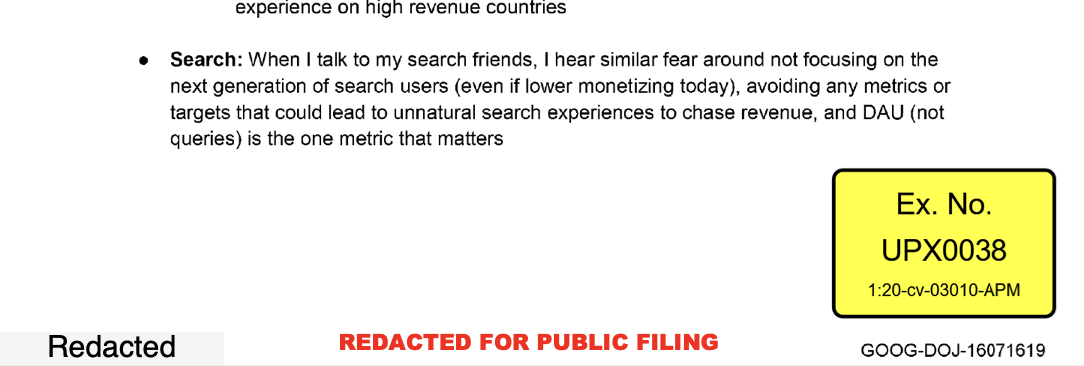TRIAL UPDATE #4: Apple Has Google’s Back, Microsoft and Everyone Else in Tech Doesn’t
September 29, 2023
This week’s testimonies came from key tech executives, with a clear divide between who in tech has Google’s back - Apple - and who doesn’t — everyone else.
In week 3 of USvGoogle, we saw the crucial trial taking on Google’s monopoly in search, inch back to limited public access with Judge Amit Mehta saying he wants next week’s testimonies “to be as open as possible.” This follows a week of strong media coverage decrying the secrecy of the trial, putting some blame on the judge for appeasing Google and Apple’s requests for secrecy.
We hope you’re following Big Tech on Trial for latest updates. Judge Amit Mehta ruled that redacted exhibits of past Google memos, emails and presentations shown as evidence in court can be posted online. DOJ has to let Google and others know which exhibits will go up by 6pm, and then they have three hours to object. If there are objections, Mehta will consider them the following day.
Of the redacted memos posted online this week, we saw that Michael Roszak, vice president for finance at Google, in July 2017, likened the company’s search advertising business to selling drugs, calling it “one of the world’s greatest business models ever created” since the company can “ignore” users and focus on generating revenue from advertising.
Screenshots of evidence exhibits shown in court from Google executive Roszak's documents in 2017.
The trial kicked off this week with the highest profile witness yet –Apple’s Eddy Cue– being grilled by the DOJ. Cue has worked for Apple since 1989, he reports directly to CEO Tim Cook and is a top executive who oversees Apple Music, Apple News, Apple Podcasts, the Apple TV app, Apple TV+, Apple Pay, Apple Card, Maps, Search Ads, Apple’s iCloud services, and Apple’s productivity and apps like Reminders and Notes. Here’s a summary from our friends at the TWIGA newsletter:
Cue acknowledged that Apple knew about Google’s “creepy” tracking of its users via search. He also claimed (with no evidence) that users would be "confused" by a prompt on which search engine they want to use. Cue said Apple chose Google to be Safari’s default search engine as Google provided “the best” product. This was unsurprising considering Google has paid tens of billions of dollars to Apple to secure Google’s default status. But an email from Cue to Apple CEO Tim Cook said: “I told [Pichai] that him and I need to sit down alone . . . and agree to economic terms or else [Apple] won’t move forward.” DOJ argued Apple’s position revealed just how important the money is to the agreement.
That’s all for now. We’ll let you know of all significant developments in the trial as they happen. We’ll be there, watching, learning and rooting for justice.
Next we heard from the DOJ’s expert witnesses who backed up their argument that Google used money, secretive contracts to build scale and data that kept out potential innovation and competitors in search. The witnesses included executives from Microsoft and Alex Austin, the founder of Branch Metrics, an upstart search app, who in court testified, “Time and again, the Google contract was the primary blocker for us distributing app search.” Austin explained to the judge how Google stymied the development of their upstart search app by invoking its exclusive revenue-sharing deals with Samsung, Verizon, AT&T, and T-Mobile.
Mikhail Parakhin, Microsoft’s CEO of Advertising and Web Services, took the stand and testified that while there are diminishing returns when it comes to scale and search quality that is not the case for the effect scale has on advertising revenue. Parakhin explained that if a search engine, such as Google, has a larger percentage of the market, it is easier to raise advertising prices. Regarding Google’s presence in international markets, Parakhin explained that there are just two markets where Google faces more competition: Russia and South Korea. Parakhin said that Google invests more in those markets compared to others. This neatly illustrated DOJ’s argument that increased competition leads to more investments towards innovation.
Then we heard from Microsoft’s VP Jon Tinter, who testified that Microsoft made offers to Apple that would share greater than 100% of its revenue or gross profit — and yet Apple would still stick with Google’s revenue share offer, which Tinter mentioned in passing might be 60%. This created a dynamic that Tinter believes drove up the value of Google’s search default agreements for Apple. “We were just big enough to play but probably not big enough to win, if that makes sense,” he said in court.
Tinter didn’t testify about the dollar amount of Microsoft’s or Google’s offers to Apple, but he said that Microsoft thought its financial offer was higher “based on our best estimates of the revenue payments that Google was making to Apple in the United States.”
“The optimal thing for Apple to have done — and again, I think in closed session, maybe we’ll end up looking at some of the sort of math on this — would have been to have switched to Microsoft in the United States, taken our aggressive offer there, and continue with sort of Google in the rest of the world.”
But Apple stuck with Google, helping it monopolize the search market.
Microsoft CEO Satya Nadella testifies next on Monday. Judge Mehta said he wants it “to be as open as possible.”
But we have a government shutdown in the cards and that might put us back at square one with no access to the damning evidence shown in court at this landmark monopoly trial.

